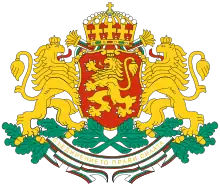Mila Rodino
"Mila Rodino" ("Мила Родино" [ˈmiɫɐ ˈrɔdino], translated as "Dear Motherland" or "Dear native land") is the current national anthem of Bulgaria. It is based on the music and text of the song "Mila Rodino" by Tsvetan Radoslavov, written and composed as he left to fight in the Serbo-Bulgarian War in 1885. The anthem was adopted in 1964. The text has been changed many times, most recently in 1990.
| English: Dear Motherland | |
|---|---|
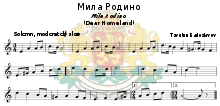 | |
National anthem of | |
| Lyrics | Tsvetan Radoslavov, 1885 |
| Music | Tsvetan Radoslavov, 1885 |
| Adopted | 8 September 1964 (by of People's Republic of Bulgaria)[1] 18 May 1971 (reaffirmed in the Zhivkov Constitution)[1] 10 November 1989 (by Bulgaria)[1] 12 July 1991 (reaffirmed in the Constitution of Bulgaria)[1] |
| Audio sample | |
"Mila Rodino" (instrumental)
| |
Between 1886 and 1947, the Bulgarian national anthem was "Maritsa Rushes" ("Shumi Maritsa", "Шуми Марица"); from 1951 to 1964, it was "Dear Bulgaria, land of heroes" ("Balgariyo mila, zemya na geroi", "Българийо мила, земя на герои"); in the brief period between these two, it was the march "Our Republic, Hail!" ("Republiko nasha, zdravey!", "Републико наша, здравей!").
History
Creation
The song was created by the composer Tsvetan Radoslavov in 1885 after his participation in the Serbo-Bulgarian War. He was inspired to create the song based on his poems when he saw Serbian students singing their own patriotic song on their journey home.[2] It was first printed in 1895 in Part I of "Music Textbook" by K. Mahan.[3]
Adoption as the national anthem
In the 1960s, after the de-Stalinization process, the poet Georgi Dzhagarov began an effort to replace the previous anthem, which include references to Stalin and because the lyrics of the anthem was similar to the anthem of the Soviet Union. After discussing with Todor Zhivkov, the General Secretary of the Bulgarian Communist Party, Zhivkov accepted the idea, and soon, by the Order No.1093, on 29 March 1962, the Council of Ministers held a competition for the lyrics and the music for the new anthem, with the deadline for the submission of lyrics on 1 May 1963 and the music on 1 November 1963. The composition of the committee for the new anthem was selected by Zhivkov himself, and the lyrics for the new anthem must be finalized on 1 September 1963 and for the music on 1 March 1964. The Council of Ministers also draws up a panel of experts to look at the projects submitted in advance and to put the best of the proposals for discussion with the committee.[1][4]
After the proposals for the lyrics and the music were submitted, none of the proposals satisfies them, so they accepted the advice of Georgi Dzhagarov to use "Mila Rodino" as the music for the new anthem. The composition of lyrics were assigned to Georgi Dzhagarov and Dmitry Metodiev, while the melody of the anthem was revised with further harmonization by Philip Kutev and Alexander Raichev.[1]
Under Zhivkov's orders, Georgi Dzhagarov and Dimitar Metodiev were resided in the Vrana Palace to compose the text of Mila Rodino.[5]
During the composition of the lyrics, Georgi Dzhagarov was not particularly proud of his creation. He preferred the anthem without the mentions of the Soviet Union and the leadership of the Bulgarian Communist Party in the third verse of the anthem. An alternate version of the third verse can be found in Dzhagarov's manuscript :[1]
- Дружно, братя българи! (Together, Bulgarian brothers!)
- Греят нови върхове, (New pinnacles shine,)
- Знамето над нас се вее (The flag flies above us)
- и на подвиг ни зове. (and calls us to heroic deeds.)[1]
The final composition of the lyrics consisted of the original first verse and the chorus of the anthem by Tsvetan Radoslavov, and the new two verses, which the second verse has references to the fight for the independence of Bulgaria and the fight against fascism in World War 2, and the third verse has references to the Soviet Union/Russian SFSR/Communist Party of the Soviet Union, and the Communist Party of Bulgaria.[6]
On 8 September 1964 Mila Rodino was finally affirmed by the Presidium of the National Assembly, with the Decree No. 534, as the national anthem of Bulgaria.[7] The first performance of the song as the national anthem of Bulgaria took place on 9 September 1964, the 20th anniversary of the Socialist Revolution of 9 September.[4]
Criticism
In 1964, before the affirmation of "Mila Rodino" as the national anthem, the decision met resistance from Petko Staynov. Staynov argues that the melody is Jewish (Ashkenazi) and this makes the song not suitable for being the anthem of Bulgaria. Dobri Hristov counters the argument, stating that there are hundreds of melodies in Bulgarian songs which are borrowed from other people and had become an integral part of the Bulgarian musical heritage.[1]
This statement led Staynov being removed from the committee for the new anthem by Todor Zhivkov.[1]
Proposals for a new anthem
During the discussion for the new constitution of Bulgaria in the 7th Grand National Assembly, there are some proposals submitted for a new anthem. The proposals include "Shumi Maritsa" (Bulgarian: Шуми Марица, English: Maritsa Rushes), the Bulgarian national anthem from 1886 until 1947, and "Vŭrvi, narode vŭzrodeni" (Bulgarian: Върви, народе възродени, English: Onward, peoples resurrected), the anthem of the Bulgarian education.[1]
The most recent one was the petition by writer Nikola Indzhov to change the anthem of Bulgaria to "Vŭrvi, narode vŭzrodeni".[8][9]
Regulation on the anthem
Current regulation
According to the Institutional Identity of the Administration of the State of Bulgaria,[10] there are two versions of the anthem, the full and the abridged version.
Official version of the anthem
- The official version of the anthem in an instrumental rendition for wind orchestra is performed by the Brass Orchestra of the National Guard.
- The official version of the anthem in an instrumental rendition for symphony orchestra is performed by the Bulgarian National Radio Symphony Orchestra.
- The official version of the anthem in a vocal version is performed by the Mixed Choir of the Bulgarian National Radio.
Performances of the anthem
The anthem is to be played at the following occasions:
- celebration of the Liberation Day on 3 March
- on public holidays, celebrating historical events and personalities
- ceremonies for raising the flag of the Republic of Bulgaria
- state and official visits
- ceremonies for offering a wreath to the monument of the Unknown Soldier
- diplomatic ceremonies
- military ceremonies
- other official events of national importance
- on the initiative of the state authorities
- local celebrations with a decision of the Municipal Council
The abridged version of the anthem can be played at the following occasions:
- on cultural and sporting events
- on the occasion of the opening of the school year
The anthem of the Republic of Bulgaria can only be performed once a day, on the same ceremony.
Bans on the usage of the anthem
The anthem of the Republic of Bulgaria can not be used in advertising, with the exception of national campaigns taken by state authorities. The anthem can not be used as part of another melody or song, to be performed in remixed variants with text other than the legally established by means of musical instruments that create a humorous sound, with pauses, interruptions or extensions of the tones, which change the original sound.
Original regulation
The first regulation on the anthem came from the Decree No. 534 "On the approval of the text and the music of the national anthem of the People's Republic of Bulgaria", which was published on 8 September 1964.[7]
1. The national anthem shall be performed with in the following cases:
(a) when receiving and sending official foreign state and party delegations led by the Head of State, the President of the Council of Ministers or the First Secretary of the Communist Party of Bulgaria and the solemn performances, meetings and receptions organized in their honor, unless otherwise agreed between the parties, as well as laying wreaths from them in front of the Georgi Dimitrov Mausoleum and the Monument to the Soviet Army and the Mound of Brotherhood.
On sending or receiving a Bulgarian official state or party delegation, headed by persons of the rank mentioned in the previous paragraph - by appropriate decision;
(b) at formal official meetings, shows and receptions organized in connection with the national holiday of the People's Republic of Bulgaria;
(c) when letters of credit issued by foreign diplomatic agents are served;
(d) during a ceremony in connection with the national holiday of the People's Republic of Bulgaria, on the day of celebration the memory of fallen fighters against fascism and capitalism, in the Fatherland War and the national liberation movement, as well as during the funeral of high state or public figures;
(e) in the official opening of monuments with national importance;
(f) in parades of troops, in taking oath by soldiers and in giving a military honor by performing the National anthem according to the military statutes or in other cases not specified in them, ordered by the Minister of National Defense;
(g) daily broadcast on the national radio station at the end of its program;
(h) in the opening of country national or international reviews, competitions and competitions or international sports meetings of national representative teams and in awarding prizes to Bulgarian athletes and teams that rank first in them;
(i) for celebrations of patron saints of schools, higher education institutions, scientific and other institutes.
2. The national anthem may be performed at the discretion of public organizations of the working people and of solemn meetings and celebrations organized by them.
3. When the Bulgarian national anthem is performed in other country together with the national anthem of the other country, according to the established international custom, the national anthem of the other country is performed first.If the national anthem of the People's Republic of Bulgaria is performed in Bulgaria together with the national anthem of the other country, the national anthem of the People's Republic of Bulgaria is performed first.
4. It is forbidden to perform the National anthem at inappropriate places (restaurants, amusement facilities, etc.), except for official receptions, lunches and evenings.
5. For the application of the decree, the Minister of Foreign Affairs and the Minister of National Defense shall issue an ordinance.The implementation of this decree is entrusted to the Minister of Foreign Affairs and the Minister of National Defense.[7]
Lyrics
Bulgarian original
I |
I |
1 |
English translation
I
Proud Balkan Mountains,
next to it the Danube sparkles,
the sun shines over Thrace,
and blazes over Pirin.
Refrain:
Dear Motherland,
you are heaven on earth,
your beauty, your loveliness,
ah, they are boundless.
II
Countless fighters died,
for our beloved people,
mother, give us manly strength
to continue their path.*
Refrain
III
Together, Bulgarian brothers!
Moscow is with us in peace and war!
A great party leads
Our victorious society.*
Refrain
- During communist rule, two additional verses (II and III) were added that referred to Moscow (under direct instructions of Todor Zhivkov) and the Bulgarian Communist Party, as well as the fallen fighters for Bulgaria through the years. After the changes in 1989, that part of the anthem was removed and forbidden to be performed.
Original lyrics
| Мила Родино (Bulgarian Cyrillic)[11] |
Mila Rodino (Transliteration) |
Dear Motherland (English translation) |
|---|---|---|
|
Горда стара планина, Припев: Хайде братя българи, Припев: Мила... |
Gorda stara planina, Refrain: (twice) Hajde bratja bëlgari, Refrain: Mila... |
Proud Stara Planina, Refrain: Bulgarian brothers, let's go Refrain: Dear... |
 Proud Balkan Mountains...
Proud Balkan Mountains...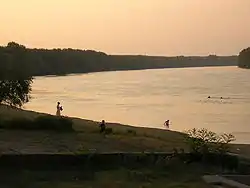 ... next to them the Danube sparkles...
... next to them the Danube sparkles...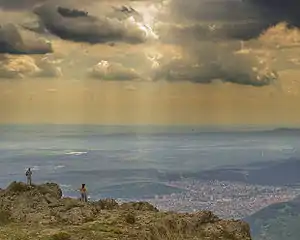 ... the sun shines over Thrace...
... the sun shines over Thrace...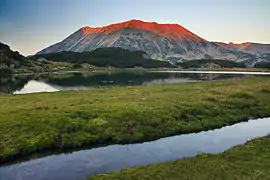 ... and blazes over Pirin.
... and blazes over Pirin.
Versions of the lyrics
Another version of the lyrics was published by composer Dobri Hristov. It was published in the Rodina collection, by the Publishing of the Bulgarian-Mohammedian Cultural and Enlightenment Friendship, in the town of Smolyan.[12]
Горда Стара-планина.
Надъ ней северъ синей,
До ней Витошъ възвишава
Гордо свойтѣ раменѣ
Припев:
Мила Родино,
Ти си земенъ рай!
Твойта хубость, твойта прелесть,
Ахъ, тѣ нѣматъ край!
Гордо Дунавътъ се лѣй!
Свойта пѣсень тихо пѣй!
Вѣченъ споменъ той за Ботевъ
Отъ гърди си ще лелѣй!
Припев
Чуй Марица, какъ шуми,
И съсъ радость си мълви,
Че тамъ, дето кърви бѣха
— Днесъ тамъ розата цъвти!
Припев
Sheet Music
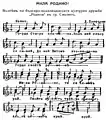 The sheet music of the alternate lyrics by Dobri Hristov.
The sheet music of the alternate lyrics by Dobri Hristov..jpg.webp) Vocal sheet music
Vocal sheet music.png.webp) Instrumental sheet music
Instrumental sheet music Vectorized sheet music
Vectorized sheet music
Notes
References
- "Химнът на България през превратностите на времето". socbg.com. Retrieved July 17, 2018.
- "1963 г. Радой Ралин лобира химн да е "Мила Родино"". www.24chasa.bg. March 3, 2016. Retrieved July 18, 2018.
- "ТАЙНАТА ИСТОРИЯ НА ХИМНА НА НАРОДНА РЕПУБЛИКА БЪЛГАРИЯ". www.tretavazrast.com. March 11, 2017. Retrieved July 18, 2018.
- "ИСТОРИЯ НА БЪЛГАРСКИЯ ХИМН". www.pamettanabulgarite.com. Retrieved July 17, 2018.
- "Мила родино". www.pamettanabulgarite.com. Assoc. Prof. Vesselka Toncheva, PhD and Ch. Prof. Grigor Grigorov, PhD. Retrieved August 25, 2018.
- "Комунистическа България – с герб-некролог и химн, възпяващ Москва и Сталин". www.pamettanabulgarite.com. December 2, 2016. Retrieved July 18, 2018.
- "Държавен вестник, брой 71 от 8.IX". September 8, 1964.
- "Предлагат смяна на химна на България" [They offer a change of the anthem of Bulgaria] (in Bulgarian). February 26, 2016. Retrieved July 19, 2016.
- "Ново 20: Предлагат смяна на химна!" [New 20: They offer a change of anthem!] (in Bulgarian). January 25, 2016. Retrieved July 19, 2016.
- "Химн на Република България". identity.egov.bg. Retrieved July 20, 2018.
- Ivan Voynikov, 2005, History of the Bulgarian state symbols. Part three: The Bulgarian anthem, in Bulgarian Archived 2016-03-04 at the Wayback Machine
- "Сборникъ РОДИНА. Издание на българо-мохамеданската културно-просвѣтна и благотворителна дружба "Родина" въ гр. Смоленъ". macedonia.kroraina.com. Retrieved August 25, 2018.
External links
| Wikisource has original text related to this article: |
- President of the Republic of Bulgaria — The President's website has a page on the national symbols of Bulgaria, including a vocal version of the anthem.
- Government of Bulgaria — The Government website also has a National Symbols page, with an instrumental version of the anthem.
- Bulgaria: Mila Rodino - Audio of the national anthem of Bulgaria, with information and lyrics
| Wikimedia Commons has media related to Mila Rodino. |
